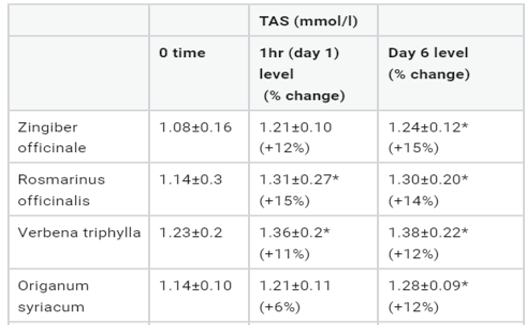Abstract
The use of medicinal herbs is widespread and growing. We tested the in-vivo effects of commonly used medicinal herbs in Jordan, on normal human volunteers after oral administration of aqueous extracts for several days, to see whether the in-vitro chemical antioxidant activity of a given herb replicates in-vivo and to see whether a given medicinal herb affects the results of selected clinical chemistry tests performed on the serum. Healthy volunteers were given orally aqueous herbal extracts daily for five days. Venous blood samples were taken before and one hour after the first dose of aqueous extract and then one day after the last dose of day five. Total antioxidant status and 13 of routine clinical chemistry tests were assayed on the serum. The tested herbs caused a significant increase in serum total antioxidant status. The studied herbs can be arranged in decreasing order of their in-vivo antioxidant strength after one hour of first consumption as follows: Nigella sativum > Rosmarinus officinalis > Zingiber officinale > Verbena triphylla > Origanum syriacum > Salvia triloba. The studied herbs except for Rosmarinus officinalis also caused a significant increase and/or decrease in 10 out of 13 laboratory tests performed on the serum. These results indicate that oral administration of aqueous extracts of medicinal herbs although improve the serum total antioxidant status, they could also significantly alter some laboratory results used for diagnosis or evaluation of diseases and this may negatively affect patient’s care. The present study highlights the importance of obtaining information regarding patients’ uptake of herbal products that might interfere with some laboratory testing.
Full text article
Authors

This work is licensed under a Creative Commons Attribution-NonCommercial-NoDerivatives 4.0 International License.

